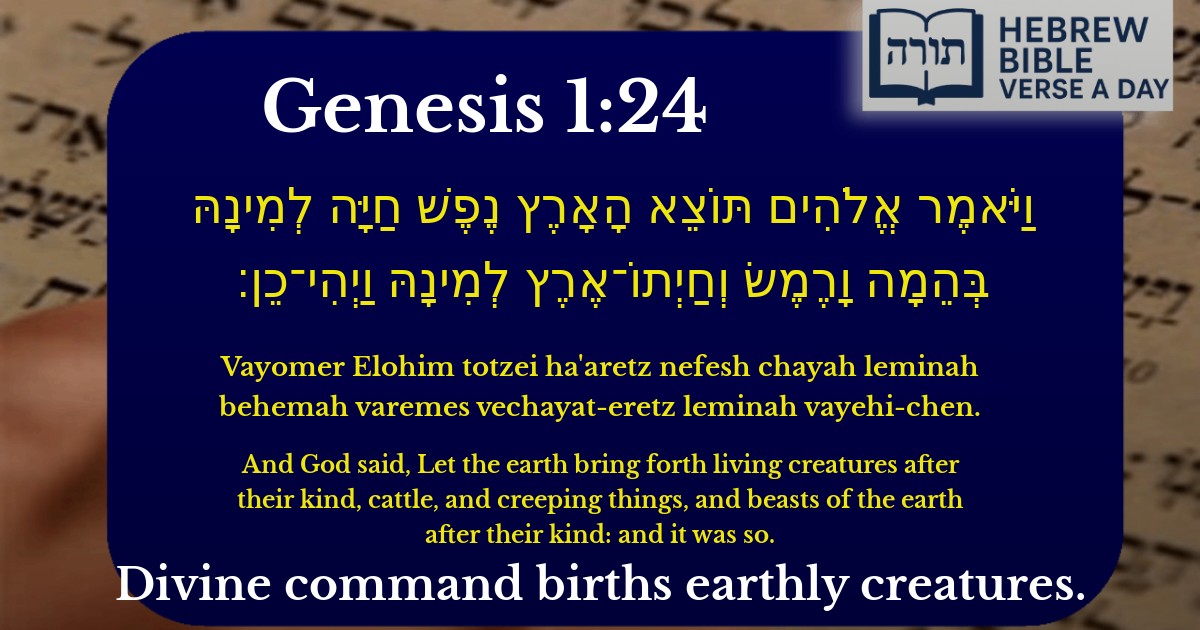Join Our Newsletter To Be Informed When New Videos Are Posted
Join the thousands of fellow Studends who rely on our videos to learn how to read the bible in Hebrew for free!
Hebrew Text
וַיֹּאמֶר אֱלֹהִים תּוֹצֵא הָאָרֶץ נֶפֶשׁ חַיָּה לְמִינָהּ בְּהֵמָה וָרֶמֶשׂ וְחַיְתוֹ־אֶרֶץ לְמִינָהּ וַיְהִי־כֵן׃
English Translation
And God said, Let the earth bring forth living creatures after their kind, cattle, and creeping things, and beasts of the earth after their kind: and it was so.
Transliteration
Vayomer Elohim totzei ha'aretz nefesh chayah leminah behemah varemes vechayat-eretz leminah vayehi-chen.
Hebrew Leining Text
וַיֹּ֣אמֶר אֱלֹהִ֗ים תּוֹצֵ֨א הָאָ֜רֶץ נֶ֤פֶשׁ חַיָּה֙ לְמִינָ֔הּ בְּהֵמָ֥ה וָרֶ֛מֶשׂ וְחַֽיְתוֹ־אֶ֖רֶץ לְמִינָ֑הּ וַֽיְהִי־כֵֽן׃
וַיֹּ֣אמֶר אֱלֹהִ֗ים תּוֹצֵ֨א הָאָ֜רֶץ נֶ֤פֶשׁ חַיָּה֙ לְמִינָ֔הּ בְּהֵמָ֥ה וָרֶ֛מֶשׂ וְחַֽיְתוֹ־אֶ֖רֶץ לְמִינָ֑הּ וַֽיְהִי־כֵֽן׃
🎵 Listen to leining
Parasha Commentary
📚 Talmud Citations
This verse is quoted in the Talmud.
📖 Chullin 60a
The verse is referenced in a discussion about the creation of animals and their categorization.
📖 Sanhedrin 108a
The verse is mentioned in the context of discussing the order of creation and the nature of living creatures.


The Creation of Living Creatures
The verse (Bereishit 1:24) describes the creation of living creatures from the earth, emphasizing their division into distinct categories: בְּהֵמָה (domesticated animals), רֶמֶשׂ (creeping things), and חַיְתוֹ־אֶרֶץ (wild beasts). Rashi explains that the term נֶפֶשׁ חַיָּה ("living soul") refers to creatures possessing vitality and movement, distinguishing them from plant life, which lacks autonomous motion.
Distinction Between Categories
Divine Precision in Creation
The phrase לְמִינָהּ ("after their kind") appears twice, underscoring that each species was created with its own unique characteristics. The Sforno explains that this repetition teaches that even within broad categories, subcategories exist, ensuring biodiversity and ecological balance.
The Earth as an Active Participant
Unlike earlier creations where God directly formed life (e.g., Adam), here the earth (הָאָרֶץ) is commanded to תּוֹצֵא ("bring forth") creatures. The Talmud (Chullin 60a) derives from this that the earth had a role in shaping their forms, though their souls were divinely implanted.
Fulfillment of Divine Will
The concluding phrase וַיְהִי־כֵן ("and it was so") signifies the immediate and perfect execution of God’s command. The Malbim highlights this as a recurring theme in Creation, demonstrating the seamless harmony between divine intention and natural order.